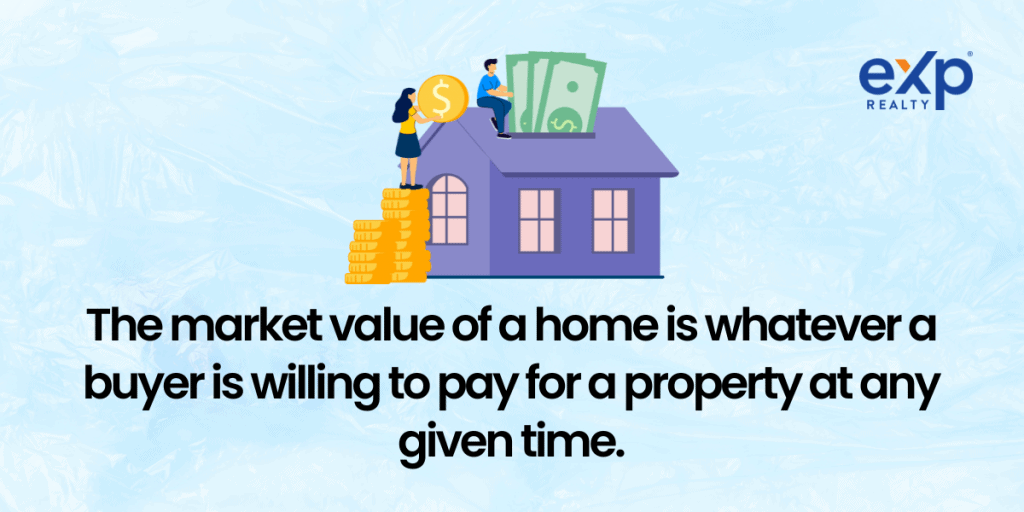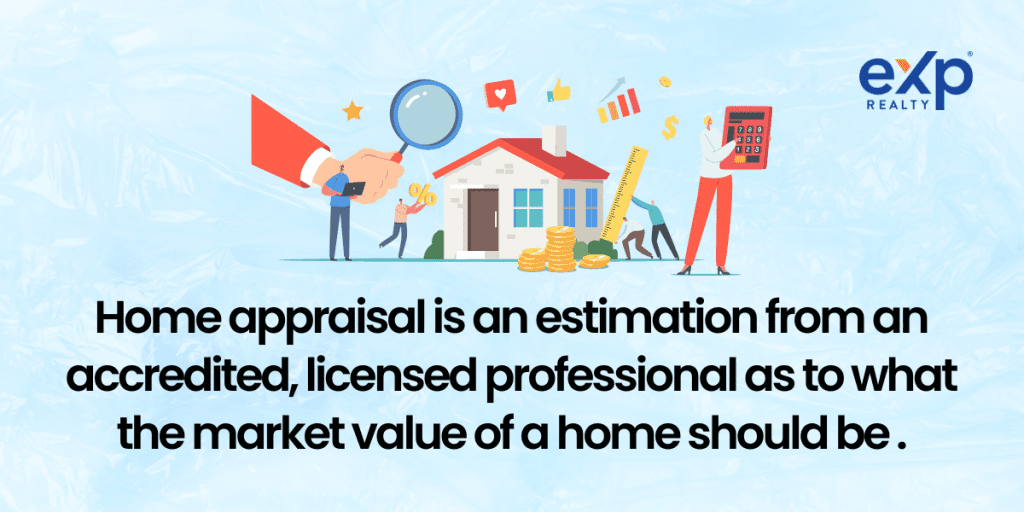Understanding the market value and appraised value will lend you key insight into how homes get their worth. The methods of determining that worth remain constant wherever you go, whether you’re looking into Chicago real estate or Natchitoches. Let’s take a look at the key differences between market value and the appraised value of a home and see just how much power the buyer has in creating value.
Different Ways Of Looking At A Home
At its core, a home is a shelter, and for many people a house is simply something one ought to have. From the market value perspective, a home is more akin to a good whose main purpose is to be bought or sold. From the standpoint of the appraised value, a home is a means of securing against risk while generating long-term profit. As a homebuyer, you should try to think of your home as these three aspects all combined, as they make up the key differences between the market value and the appraised value of a home.
What Is The Market Value Of A Home?

The market value of a home is whatever a buyer is willing to pay for a property at any given time. Though that buyer might consider how new the property is, how many bedrooms it has, its location, the price they’re willing to pay is the ultimate decider of market value, not anything particular about the home itself. It doesn’t matter how flashy or renovated your home is if no one is interested in buying it. Market value is hypothetical, meaning the market value of a house is basically up in the air until a buyer agrees upon a price. The buyer sets the fair market value.
Supply and demand come into play with homes because, at the end of the day, some people want to live in houses. Demand acts as an incentive for buyers to buy higher, raising the fair market value, and demand incentivizes the sellers to choose the highest or most convenient bidder. This is partly why a two-bedroom, 1,500-square-foot house near downtown Seattle has a higher market value than an identical home in Yakima.
Even in an extreme sellers’ market, where the seller has almost all the leverage in setting home prices, they still need a buyer to step up and agree to their prices because a seller can’t buy their own home. At the end of the day, the buyer matters more than the seller when it comes to determining market value.
The key to understanding market value is this: every factor that could influence the perceived value of a home ultimately determines what a buyer is willing to pay for it and at what price a seller is willing to sell it for. Since a home can be up for sale for an infinite amount of time but be bought in an instant, it’s more useful to work with the buyer’s price, not the seller’s, as the seller’s price is hypothetical while the buyer’s price is real.
Why Is It Important To Determine The Value of a Home?
Buyers might determine the market value of a home with the price they’re willing to pay, but seldom are they able to pay for that home all on their own. When a buyer doesn’t have enough cash on hand to buy a house, they have to borrow money from a lender and promise to pay the lender back. If the borrower can’t pay the lender back, that lender will have lost a ton of money. Lenders can somewhat mitigate the risk of losing their money by charging interest, which the buyer pays in monthly installments. But interest alone cannot fully pay back the lender, especially not if the buyer fails to pay back their mortgage on the loan in a short period.

To further cover themselves from risk, the lender could outright buy the house that the borrower wants, then have the buyer pay them back for the full price of the house in monthly installments alongside the interest payments. But this is not quite how it works in real estate.
Instead, the buyer and the lender come to an agreement. The lender will provide the money the buyer needs for the house they want, and the buyer will pay back that sum of money (the principal) along with interest. If the buyer defaults, the lender will take the house in question as collateral and then sell it to make their money back.
This only works if the collateral (the house) is worth as much as the lender’s loan. To make sure that the loan they lend lines up with the market value of the house, the lender will hire an appraiser to determine that they can sell that house in the future and make their money back if the borrower defaults.
What Is The Appraised Value Of A Home?

There’s an inherent, healthy distrust of the market value. Due to a million different factors, home prices rise and fall over the course of time. This is a fact of life for anything subject to supply and demand, such as houses. Although homes do, almost as a rule, appreciate over time, this is a slow appreciation rate over decades, and in the intervening years, prices can fluctuate wildly.
So the lenders don’t want to simply trust in the market value of the present. They need to be thinking about the future too. This is why they have the value of a home appraised, which is basically an estimation as to what the market value of a home should be independent of what the buyer thinks it is.
Appraisers check out the market values of other houses in the area in question. They look at square footage, at the interior design and details of the house, the age of the house, etc. These appraisers are accredited, licensed professionals whom the lenders pay to mitigate the considerable risk of lending out hundreds of thousands of dollars to a single individual.
Now, if the appraised value of your home turns out to be lower than the market value that you and the seller decide on (after all, you’re the buyer and thus the ultimate market value decider) you might consider getting a second appraisal done. If the appraisal comes in higher than the market value, that’s good news for you and the lender, because the market price will not change to meet the appraised price. With an appraised value higher than the market value, that’s basically free equity for the buyer and more assurance for the lender that they can make a profit even if the borrower defaults on their payments.
So What Are The Key Differences Between The Market Value And The Appraised Value of A Home?
The market value is ultimately up to the buyer, and the appraised value is ultimately up to the appraiser. Naturally, the price the buyer is willing to pay is dependent on the potential prices of all the other buyers interested in the same home, but when one buyer comes to the table with the seller and sets a price, that one buyer’s agreement is the market value. Naturally the appraiser will factor in the market values of other homes in the area, and the physical makeup of the house itself, but it’s ultimately the appraiser’s call as to what the appraised value is.
In this way, market value and appraised value are inherently unique to the house in question, the seller, the buyer, the lender, and the appraiser who all have to work together and eventually agree that a home is actually worth a certain price. This process can be complex or it can be relatively straightforward if you use a real estate agent. We hope you’ve found this investigation into home values interesting, and feel more empowered as a home buyer in playing a vital role in real estate in general.





